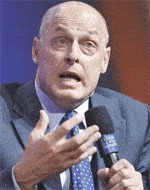 |
|
Hank Paulson: Eager for Uncle Sam to avoid bailing out major American banks. |
The United States Treasury in effect told the big American banks last month to clean up their own mess and not to look to the federal government for a bailout to help them recover from the asset-backed lending crisis. It got a half dozen or more of the biggest banks together in a room and facilitated the creation of a private sector debt rescue fund that ultimately could reach $100 billion. Citi, Bank of America, JPMorgan Chase and a few others agreed to create and provide liquidity support to the fund.
The Treasury obviously has a lot at stake besides simply enhancing liquidity in the short-term credit markets and keeping the subprime contagion from spreading and damaging the broader economy. Nobody had to remind treasury chief Hank Paulson that the savings-and-loan crisis of the 1980s ended up costing around $150 billion, of which about $125 billion was subsidized by the US government. A private sector bailout would avoid creating even bigger US budget deficits that could undermine the value of the already slumping dollar and drive up long-term interest rates.
The bailout fund will only buy highly rated assets and, therefore, won’t have a direct effect on the subprime market. However, it will help banks to refinance asset-backed commercial paper and to meet pending redemptions. In a form of reverse financial engineering, the fund would repackage credit securities to make them more transparent and more appealing to investors. This could be enough to get the credit markets functioning in a more normal manner.
“This proposal will complement other solutions investors and asset managers may utilize in committing and deploying capital to support more efficient markets,” the Treasury said in a statement. While $100 billion may seem like a lot of money, it might not be enough to head off a continuation of the crisis, and poor old Uncle Sam could yet be forced to pick up part of the tab.
Gordon Platt



